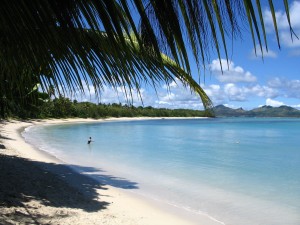October 30, 2012, by Simon McGrath
Do we want knowledge without borders?
 Preparing a workshop on writing for journals in Suva, Fiji, and working on a research bid with Pacific Island colleagues, I was struck by the realisation that I could only think of one journal article in the leading international and comparative education journals that had been written by an author from the region, and that paper was from 1993. Nor does this mean that USP education staff are regular publishers of papers in other international journals or that there are vibrant journals in the region.
Preparing a workshop on writing for journals in Suva, Fiji, and working on a research bid with Pacific Island colleagues, I was struck by the realisation that I could only think of one journal article in the leading international and comparative education journals that had been written by an author from the region, and that paper was from 1993. Nor does this mean that USP education staff are regular publishers of papers in other international journals or that there are vibrant journals in the region.
Does this matter and, if so, why? One of my greatest academic concerns is about what I see as a neoimperial tendency in much research. As a number of authors such as Connell, Tuhiwai Smith and Hountondji have suggested, what is actually context-specific data and theories about parts of the global North is presented unproblematically as universal knowledge. To play with the metaphor of this blog and network: there are no borders to knowledge in this model as the big battalions of Anglo-American social science have already crossed them and annexed the territories beyond.
One example of where I think that the rest of us are missing out is the richness of the methodological discussions I had with a number of USP colleagues regarding the question of whether there were particular Pacific Island research methods (such as talanoa and talanga [i]) that could usefully be part of a research repertoire in the region; and, if so, how they could be married with Western social science methods, if at all. This leads on to a bigger question about the cultural groundings of all research methods, which complements my concerns about the need to understand the contextual nature of theories above.
I am not claiming that there are no universal theories or methods but I am arguing that such universality requires testing. In the classical scientific method, a desire to test whether a theory could be falsified might lead to seeking out cases in which the theory was most likely to break down. Thus, we might be expected in social sciences to be far more robust in testing theories in very different contexts from those of their generation.
However, I want to go further than this and suggest that we should also be seeing places in the global South as sites of theory generation, rather than a source of exotic exceptions to “universal” theory. The South Pacific with its immense range of state sizes, languages, cultures, colonial pasts and presents, etc., is surely a rich potential source of theory generation, and my colleagues at USP can and should be playing a role as theory generators.
In subsequent blogs, I want to ask why this unevenness in knowledge production has happened and what might be done about it. And, if we can get research funding for our planned collaboration, we hope to be able to address these questions in more detail and to develop a practice that seeks to reflect consciously on some on the inequalities that currently shape the global knowledge production map.
Simon McGrath (Director of Research and Professor of International Education and Development – School of Education)
[i] Talanga is premised on the notion of a stakeholder consultation based on consensus and used as a semi-structured contextual approach to dialogic method. Talanoa is a culturally-grounded approach to dialogic methods of participant–researcher conversations that are preferred to interviews and or formalised focus group discussions.
No comments yet, fill out a comment to be the first

Leave a Reply